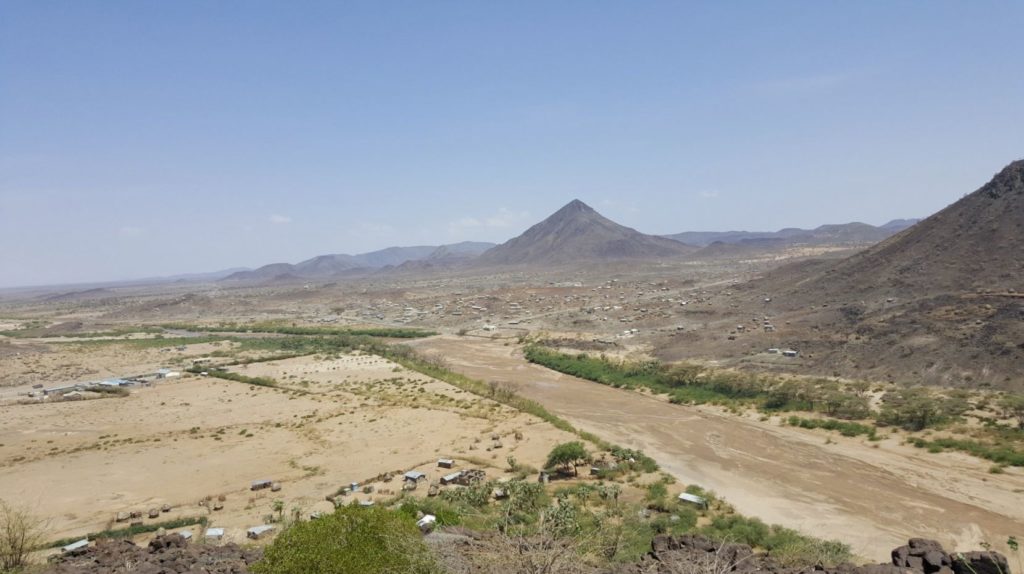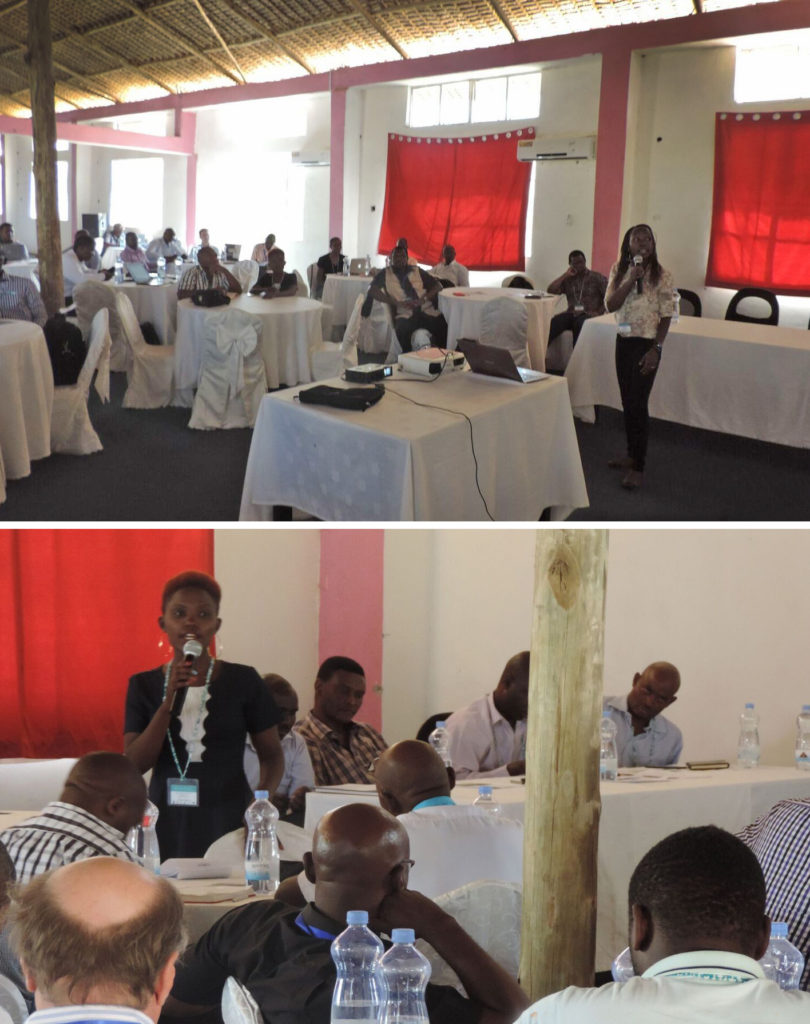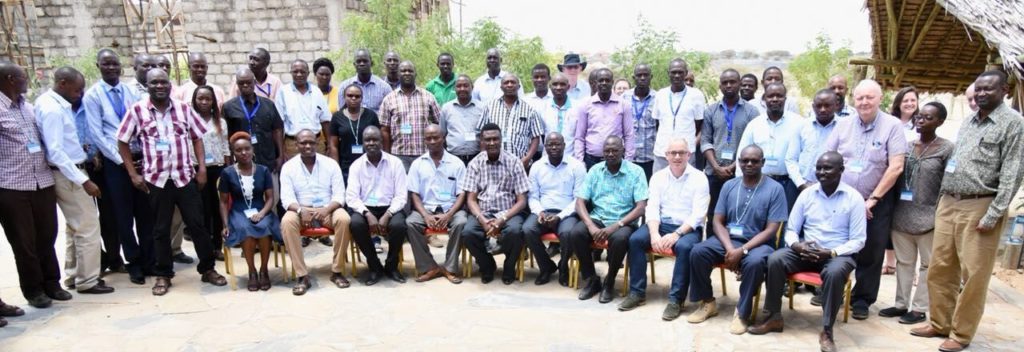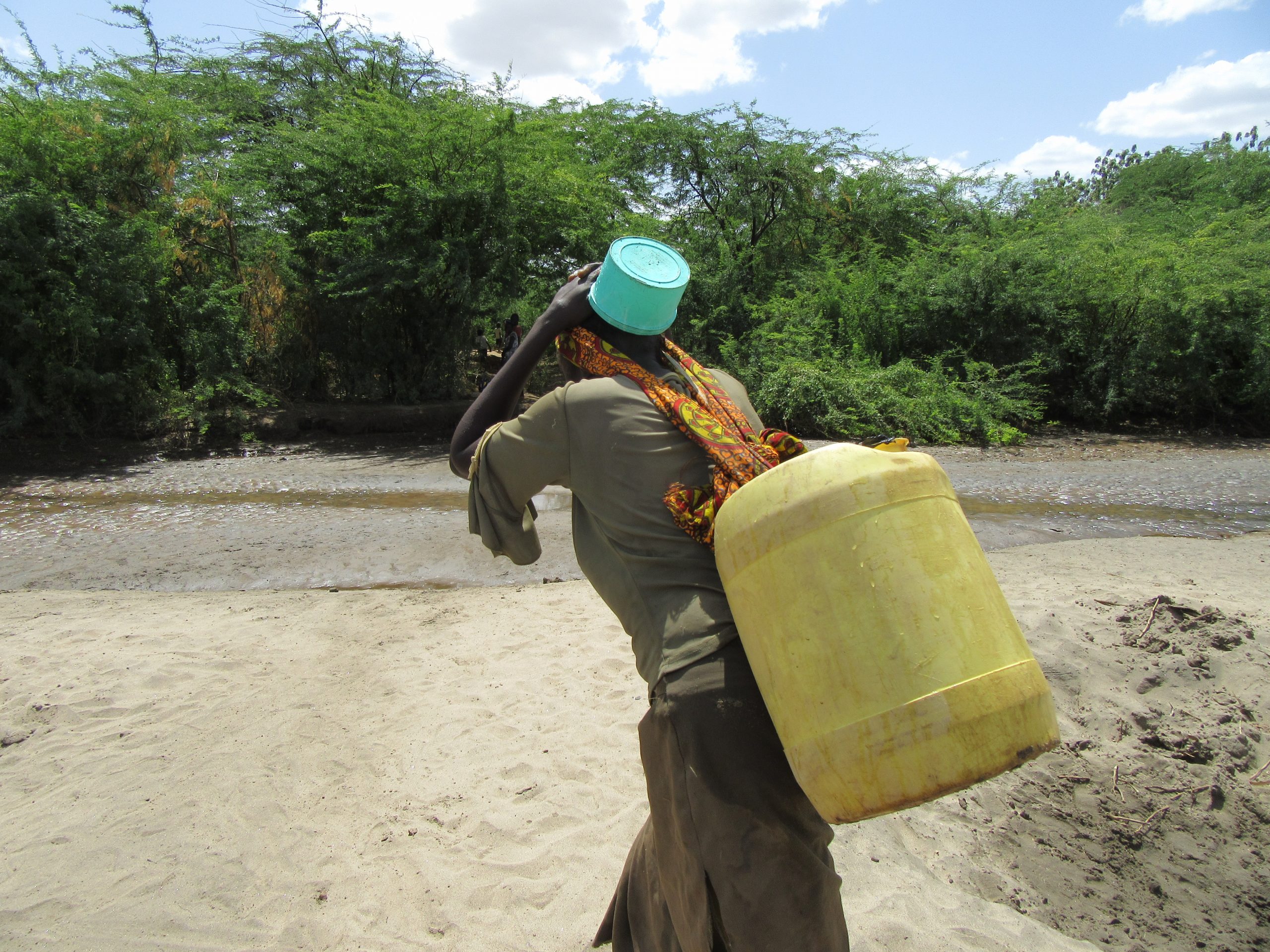Dr Rob Hope, University of Oxford, Prof Daniel Olago, University of Nairobi and Dr Andrew Trevett, UNICEF Kenya
The people of Turkana are resilient and resourceful. Rain is rare, surface water is ephemeral and groundwater is often deep and undrinkable. Without water, poverty stagnates and growth is stunted. Traditional, nomadic herding evolved in response to these harsh and risky climates. Settlements are few and vulnerable. Following Kenya’s devolution legislated in 2010, Turkana became energised, confident and is now growing rapidly. Lodwar is the county capital with over 60,000 people poised for growth as its strategic geographical location, recent oil discovery and improved logistics mean people and businesses are relocating, and fast.
 At the edges of Lodwar Town, the Kawalasee river, a tributary of the Turkwel, is running nearly dry following months of severe drought in Turkana (taken March 2017).
At the edges of Lodwar Town, the Kawalasee river, a tributary of the Turkwel, is running nearly dry following months of severe drought in Turkana (taken March 2017).
Turkana was one of a minority of counties to re-elect its sitting governor as the people acknowledged progress is moving in the right direction. The REACH programme funded by DFID is proud to partner with Turkana County where we travelled in February 2018 to participate in workshops and meetings. The goal was to chart the progress and opportunities for our science-practitioner partnership to improve water security for the poor in Lodwar. Led by the University of Nairobi and UNICEF with the University of Oxford and the International Water Association we were guided by the words of H.E. Deputy Governor Emuria on how the ‘science of water is critical for how Turkana plans and grows’.
We shared recent findings of the critical but poorly understood ‘long rains’ which fall in uncertain patterns in March, April and May. The recent ‘drought’ of 2016 may be better understood as a sequence of below average years compounded over time. This may guide new thinking on different ways to invest in climate resilience which may save money, protect livelihoods and create a new logic of more sustainable development.
Relatively significant amounts of rain may fall during other times of the year, but it is erratic, short-lived and presently unpredictable. Unpredictable rainfall means decision-making under uncertainty is necessary. The Turkwel River and its upstream users shape how much, and when, river and ground water are available for the town. Equally, the Napuu aquifer, nested below the town, is increasingly understood as the buffer to droughts and uncertain river flows. Ongoing hydro-geophysical analysis will better quantify this key resource base and the critical zones of recharge so urban planning and investments do not pave over nor contaminate these hidden spaces and damage prospects for future generations.
 The images show the Turkwel river under high flows caused by a four-day rainfall event on March 24-28 (left), followed by a nearly-dry river bed one day after the rains stopped (right), highlighting the impacts of the long, severe drought on groundwater recharge.
The images show the Turkwel river under high flows caused by a four-day rainfall event on March 24-28 (left), followed by a nearly-dry river bed one day after the rains stopped (right), highlighting the impacts of the long, severe drought on groundwater recharge.
Building local capacity to ensure water security is a long-term but smart investment. Ensuring women are part of this strategy would mean the county gets more value out of all its human capital. The REACH February meetings and workshops showcased work from our female, early career researchers on water security and poverty by Eunice Kivuva, geophysics and hydrogeology by Florence Tanui, water delivery planning by Martha Jepkirui, and Oxford’s Catherine Grasham on REACH’s parallel work in Wurkro town in Ethiopia. We discussed the limited representation of women in the meetings with eight women out of 60 participants in the main stakeholder workshop, through four of the seven presentations were by the women present. Recognising a greater role and voice for women in helping shape water security in Turkana will provide insights and broaden expertise with the plenary flagging these issues to be addressed in collaborative and meaningful approaches in both the short and long term.
 Florence Jerotich Tanui (top) and Eunice Kivuva (bottom) presenting at the REACH Turkana Stakeholder Meeting on Climate Resilience, Water Services and Poverty in Kenya, on 15 February.
Florence Jerotich Tanui (top) and Eunice Kivuva (bottom) presenting at the REACH Turkana Stakeholder Meeting on Climate Resilience, Water Services and Poverty in Kenya, on 15 February.
Given the first piped water was installed in Lodwar in the 1980s, a realistic time frame needs to emerge to avoid the classic, project-driven boom and bust mentality. This will require leadership from the county to progressively build a water secure town in this fragile environment. Using world-class science in partnership will not be sufficient without coordination and delivery of realistic and phased plans of water services which benefit the poor. The REACH team welcomes the challenge and the continued collaboration with our friends in Turkana as we move forward together to create models and approaches which can work across small towns in Africa.
 Group photo with participants to the REACH Turkana Stakeholder Meeting on 15 February.
Group photo with participants to the REACH Turkana Stakeholder Meeting on 15 February.

